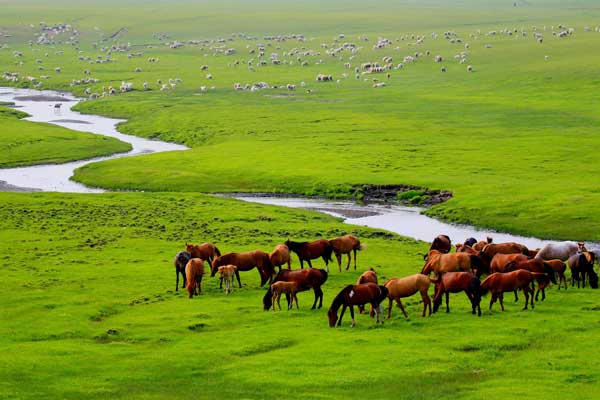
Hailar is not just famous for its scenery. The transit city is home to many legends, as Wang Kaihao finds out.
Hailar sits in the center of Hulunbuir in the far northeast of the Inner Mongolia autonomous region.
This city with a population of 340,000, where Hulunbuir municipal government is located, is a common pit stop for visitors on long journeys across the world-renowned grassland.
 |
|
Hulunbuir is home to some of the country's best grasslands.[Zhang zhongze / for china daily] |
Since I have only two days here, I have to race against time to catch the unique corners of Hailar.
As the car drives out of town into fresher air, suddenly all the weariness brought by travel is gone. I could not stop taking photographs of the beautiful layers of clouds against the azure sky.
Observing me, the driver surnamed Zhou smiles with pride. "I always wonder why you guys from cities like these clouds. It is normal for us."
As we enter the grassland, the clouds become too heavy and it starts to rain.
"The climate is getting drier in recent years," Zhou says. "It is rare to see such heavy rain in this season. It is good for the grass."
As the rain reduces to drizzle, I immediately ask the driver to stop the car so that I can feel the grass.
Unnamed yellow flowers have just begun to bloom. It is hard to walk across the high grass. A large herd of cows rest in the cool weather, oblivious to my presence.
Grass is not the only natural wonder of this place. Hills in the west of Hailar offer a national forest park, covering an area of approximately 150,000 hectares. Pines spread restlessly on the slopes and valleys.
Men and women of the Mongolian ethnic group twist colorful khatag — blessing silk piece — on the branches of a 500-year-old plant, nicknamed "God of Tree".
The air is extremely fresh after the rain. I climb up to the highest point of the park, 664 meters above sea level. The scene of Hailar's downtown looks like a mirage.
If I had not read the tourists' brochure, I would not have guessed the many legends buried under the marvelous landscapes.
Hake Cultural Relics, located 30 km to the east of Hailar, is the site where nine Neolithic relics were discovered in 1985.
I wander into the 1,500-square-meter museum, which exhibits items including jades, daily articles and weapons, from 4,000 to 5,500 years ago.
There are more than 280 Neolithic relics around Hulunbuir, considered by archeologists to be the origins of many nomadic civilizations in northern China.
The city of Hailar was first built in 1734, and has become the political, cultural and economic center of Hulunbuir since then.
I continue my exploration of local history and find the relics of a huge underground fortress that was completed in 1937 by Japan's Kwantung Army during its occupation of Hailar until the end of World War II in 1945.
The fortress once covered an area of 21 square kilometers and had a complex structure to guard against the former Soviet Union. It is one of the biggest fortifications built in Northeast China.
The relic is now renamed Anti-Fascism War Memorial Park to honor the united efforts of Soviet Union, Mongolia and China against Japanese invasion and in memory of the victims of the war.
In the park is an exhibition hall with articles from both sides of the war. Part of the maze-like fortress is open to the public.
The cold and moist underground reminds me of the miserable history. I pray in front of a site with remains of Chinese laborers forced by Kwantung Army to dig the tunnels.
It is already dusk when I arrive back in downtown Hailar.
Yimin River quietly flows in the sparkling neon lights, which also outline the town's skyline filled with Russian-style constructions.
Mongolian elements can be found on every corner. The street lamps are decorated in the shape of morin khuur (Mongolian bowed stringed instrument). Totems of Ewenki, Oroqen and Daur, three other major ethnic groups in Hulunbuir, dot the facades of the buildings by the main thoroughfare.
Although physically tired from a day spent in the beauty of nature and the vicissitude of history, I'm happy.
Sitting by the river with a bottle of celebrated Hailar beer, I'm filled with a sense of peace as I enjoy the breezy night scene.
Contact the writer at wangkaihao@chinadaily.com.cn.
